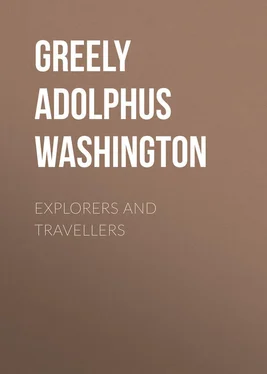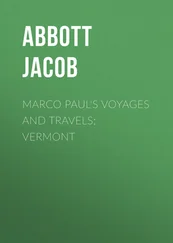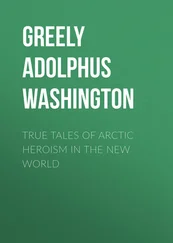Adolphus Greely - Explorers and Travellers
Здесь есть возможность читать онлайн «Adolphus Greely - Explorers and Travellers» — ознакомительный отрывок электронной книги совершенно бесплатно, а после прочтения отрывка купить полную версию. В некоторых случаях можно слушать аудио, скачать через торрент в формате fb2 и присутствует краткое содержание. Жанр: literature_19, foreign_antique, foreign_prose, Путешествия и география, на английском языке. Описание произведения, (предисловие) а так же отзывы посетителей доступны на портале библиотеки ЛибКат.
- Название:Explorers and Travellers
- Автор:
- Жанр:
- Год:неизвестен
- ISBN:нет данных
- Рейтинг книги:3 / 5. Голосов: 1
-
Избранное:Добавить в избранное
- Отзывы:
-
Ваша оценка:
- 60
- 1
- 2
- 3
- 4
- 5
Explorers and Travellers: краткое содержание, описание и аннотация
Предлагаем к чтению аннотацию, описание, краткое содержание или предисловие (зависит от того, что написал сам автор книги «Explorers and Travellers»). Если вы не нашли необходимую информацию о книге — напишите в комментариях, мы постараемся отыскать её.
Explorers and Travellers — читать онлайн ознакомительный отрывок
Ниже представлен текст книги, разбитый по страницам. Система сохранения места последней прочитанной страницы, позволяет с удобством читать онлайн бесплатно книгу «Explorers and Travellers», без необходимости каждый раз заново искать на чём Вы остановились. Поставьте закладку, и сможете в любой момент перейти на страницу, на которой закончили чтение.
Интервал:
Закладка:
A. W. Greely
Explorers and Travellers
The compiler of a series of sketches of American Explorers and Travellers experiences at the very outset a serious embarrassment from the superabundant wealth of original material at his command. The history of America for two hundred years after the voyage of Joliet has been the history of courageous, persistent, and successful exploration, wherein the track of the explorer, instantly serving as a trail for the pioneer, has speedily broadened into the wagon-road of invading immigrants.
Explorations and journeys of such an extent as in other and older lands would have excited praise and merited reward have been so frequent in this continent as to pass almost unnoticed. Hence the scope of this modest volume is necessarily confined to explorations of great importance or peculiar interest, and when made by men of American birth who are no longer living.
In deference to the author’s advisers, two exceptions have been made – Du Chaillu and Stanley, Americans by adoption – otherwise African exploration, so wondrously successful in this generation and so fruitful in its results, would have been unrepresented. Again, the unparalleled growth and progress of our American republic owes no small debt to the wealth of physical vigor and strong intellectuality contributed by its sturdy emigrants. These men, American in idea, purpose, and action, whose manhood outgrew the slow evolution of freedom in their natal country, merit recognition. What thousands of other naturalized citizens have industrially wrought of the wonderful and great in this country, these selected representatives have equalled in African exploration.
A chronological arrangement appeared best suited to these sketches, which from Joliet to Frémont exhibit the initiation, growth, and development of geographic discovery in the interior and western portions of the United States. Since the sketches rest very largely on original narratives some current errors at least have been avoided.
Generalization and criticism have been made always with reference to later exploration, which necessarily enhances or diminishes the importance of any original work.
I
LOUIS JOLIET,
If one should ask which is the most important river basin in the world, there is no doubt that the Mississippi would be named, with its million and a quarter square miles of area and its twenty-five or more billions of aggregated wealth. Favored in climate, soil, and navigable streams, and endowed with practically inexhaustible veins of coal, copper, iron, and silver, feeding the world with its hundreds of millions of bushels of corn and wheat, and clothing it by other millions of bales of cotton, it is hardly so astonishing that within 217 years from its discovery by Joliet this greatest of river basins should be the abiding-place of twenty-seven and a half millions of people.
Speaking of Joliet, Bancroft wrote that his short voyage brought him immortality; but in the irony of fate his explorations have not even given his name a place in the last edition of the Encyclopædia Britannica. In writing on American explorers, it seems most fitting that this series of sketches should be headed by this Canadian, whose name is scarcely known by one in a thousand. That aught is obtainable concerning the details of his life is due to the investigations of Shea, which later were admirably summed up by Parkman.
Louis Joliet, the son of John Joliet and Mary d’Abancour, was born at Quebec, September 21, 1645. His father was a wagon-maker, in the service of the Company of One Hundred Associates, then owners of Canada.
The son in youth was imbued with devout feelings, which, possibly fostered by the elder Joliet as certain to bring station and influence in manhood, led to his being educated in the Jesuit College for the priesthood, in which indeed he received the minor orders in 1662. Four years later, in the debates on philosophy, which were participated in by the Intendant and listened to by the colonial dignitaries, Joliet showed such skill as to elicit especial commendation from the Fathers.
His future career shows that his studies with the Fathers were not lost on him, and doubtless they contributed largely to make Joliet that intelligent, well-poised leader who filled with credit all duties and positions incident to his varied and adventurous life.
It is probable, however, that during all these years he was at heart a true voyageur, and that his thoughts turned continually from the cloister and books to the forest and its attractive life. Be this as it may, he practically abandoned all ideas of the priesthood at the age of twenty-two, and turned to the most certain, and indeed, in Canada, the only path to wealth, that of a trader in furs with the Indians. In this trade only the hardy, shrewd, intelligent, and tireless subordinate could hope to thrive and rise. Success meant long and hazardous journeys into the very heart of the Indian country, where were needed great physical courage and strength, perfect skill with gun, paddle, axe, sledge, or snow-shoe, a thorough knowledge of wood-craft, indomitable will or casuistry and tact according to the occasion. To paddle a canoe from sunrise to sunset of a summer day, to follow the sledge or break a snow-shoe path before it as far as a dog can travel in a march, to track a moose or deer for leagues without rest, to carry canoes and heavy packs over long portages through an untravelled country, were the ordinary experiences of a voyageur, which were accomplished for the great part on a diet of smoked meat and boiled Indian corn, with no shelter in fair weather and the cover of an upturned canoe or bark hut in stress of storm.
Joliet did not long remain in private adventure, for in 1669 Talon, then Intendant of Canada, sent him to discover and explore the copper-mines of Lake Superior, in which quest he failed. It was on his return trip that Joliet met with La Salle and the priests Dolier and Galinée, on September 24, 1669, near the present town of Hamilton, in which direction Joliet’s Indian guide had misled him when returning from Lake Erie, through fear of meeting enemies at the Niagara portage.
Joliet’s facility for map-making in the field is evident from the fact that at this time he showed to the priests with La Salle a copy of the map that he had made of such parts of the upper lakes as he had visited, and gave them a copy of it. He moreover evidenced continued interest in religious matters by telling them that the Pottowattamies and other Indian tribes of that region were in serious need of spiritual succor. La Salle later, in November, 1680, repaid this frank tender of information of the little-known west by intimating his belief that Joliet never went but little south of the mouth of the Illinois, and is also stated to have declared that Joliet was an impostor.
In his account of La Salle’s last journey, Father Douay, referring to Joliet’s discoveries as related by Marquette, says: “I have brought with me the printed book of this pretended discovery, and I remarked all along my route that there was not a word of truth in it.”
The efforts to deprive Joliet of the credit of the original discovery of the Mississippi falls before the despatch of Count Frontenac to Colbert, then Minister, dated Quebec, November 14, 1674: “VI. Sieur Joliet, whom Monsieur Talon advised me, on my arrival from France, to despatch for the discovery of the South Sea, has returned three months ago, and discovered some very fine country, and a navigation so easy through the beautiful rivers he has found, that a person can go from Lake Ontario and Fort Frontenac in a bark to the Gulf of Mexico, there being only one carrying-place, half a league in length, where Lake Ontario communicates with Lake Erie… He has been within ten days of the Gulf of Mexico… I send you by my secretary the map he has made of it… He has lost all his minutes and journals in the shipwreck he suffered in sight of Montreal… He left with the Fathers at Sault St. Marie copies of his journal.”
Читать дальшеИнтервал:
Закладка:
Похожие книги на «Explorers and Travellers»
Представляем Вашему вниманию похожие книги на «Explorers and Travellers» списком для выбора. Мы отобрали схожую по названию и смыслу литературу в надежде предоставить читателям больше вариантов отыскать новые, интересные, ещё непрочитанные произведения.
Обсуждение, отзывы о книге «Explorers and Travellers» и просто собственные мнения читателей. Оставьте ваши комментарии, напишите, что Вы думаете о произведении, его смысле или главных героях. Укажите что конкретно понравилось, а что нет, и почему Вы так считаете.












